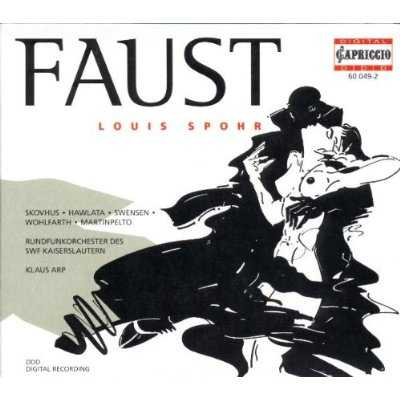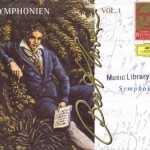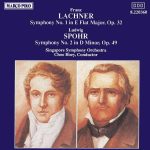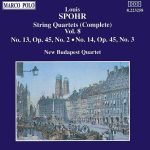
Performer: Hillevi Martinpelto, Alfred Reiter, Bo Skovhus, Brigitte Wohlfarth, Christoph Spath
Orchestra: SWR Radio Orchestra Kaiserslautern
Conductor: Klaus Arp
Composer: Louis Spohr
Audio CD
SPARS Code: DDD
Number of Discs: 2
Format: APE (image+cue)
Label: Capriccio
Size: 525 MB
Recovery: +3%
Scan: yes
Faust, opera (2 versions), WoO 51, WoO 51a
Composed by Louis Spohr
Performed by Southwest Radio Orchestra
with Ulrich Ward, Franz Hawlata, Martina Borst, Christoph Spath, Brigitte Wohlfarth, Rodrigo Orrego, Robert Swensen, Hillevi Martinpelto, Boje Skovhus, Alfred Reiter
Conducted by Klaus Arp
Disc: 1
01. Faust, opera, WoO 51, WoO 51a: Ouvertüre
02. Faust, opera, WoO 51, WoO 51a: Act 1. No. 1. Introduction. In Sinnenlust so sinnlos leben
03. Faust, opera, WoO 51, WoO 51a: Act 1. No. 1. Duet. Ha! du wähntset, armer Tor
04. Faust, opera, WoO 51, WoO 51a: Act 1. No. 1a. Recitative. Der Hölle selbst will ich Segen entringen
05. Faust, opera, WoO 51, WoO 51a: Act 1. No. 1a. Aria. Liebe ist die zarte Blüte
06. Faust, opera, WoO 51, WoO 51a: Act 1. No. 2. Aria & Chorus. Der Wein erfreut des Menschen Herz
07. Faust, opera, WoO 51, WoO 51a: Act 1. No. 3. Duet. Folg dem Freunde mit Vertrauen
08. Faust, opera, WoO 51, WoO 51a: Act 1. No. 4. Duet & Chorus. Nur der ist frei, der nichts zu lieben hat
09. Faust, opera, WoO 51, WoO 51a: Act 1. No. 5. Scene. Die stille Nacht entweicht
10. Faust, opera, WoO 51, WoO 51a: Act 1. No. 5. Aria. Ja ich fühl’ es, treue Liebe
11. Faust, opera, WoO 51, WoO 51a: Act 1. No. 6. Scene. Beflügle den Lauf, zögernde Sonne!
12. Faust, opera, WoO 51, WoO 51a: Act 1. No. 6. Aria & Chorus. Ja, hoffe Kunigunde!
13. Faust, opera, WoO 51, WoO 51a: Act 1. No. 7. Trio. Ich kann nicht ruh’n, ich kann nicht rasten
14. Faust, opera, WoO 51, WoO 51a: Act 1. No. 8. Finale. Nun wohlan! Ich halte Wort
Disc: 2
01. Faust, opera, WoO 51, WoO 51a: Act 2. No. 9. Introduction
02. Faust, opera, WoO 51, WoO 51a: Act 2. No. 9. Scene (Blocksbergszene). Brenne Laterne! Nahe und ferne dämmere auf!
03. Faust, opera, WoO 51, WoO 51a: Act 2. No. 10. Chorus. Sende Himmel Segens Fülle
04. Faust, opera, WoO 51, WoO 51a: Act 2. No. 11. Cavatina. Dürft ich mich nennen sein eigen
05. Faust, opera, WoO 51, WoO 51a: Act 2. No. 12. Adagio
06. Faust, opera, WoO 51, WoO 51a: Act 2. No. 13. Scene. Wie ist mir! Welch ein Zwist erhebt sich
07. Faust, opera, WoO 51, WoO 51a: Act 2. No. 13. Aria. Blöder Tor! Ich kann hier fragen!
08. Faust, opera, WoO 51, WoO 51a: Act 2. No. 13a. Scene. Ich bin allein, des Abend Nähe regt die Tätigkeit
09. Faust, opera, WoO 51, WoO 51a: Act 2. No. 13a. Aria. Wie dich nennen, seltsam neues Sehnen
10. Faust, opera, WoO 51, WoO 51a: Act 2. No. 14. Duet & Chorus. Lang mögen die Teueren leben
11. Faust, opera, WoO 51, WoO 51a: Act 2. No. 14. Sextet & Chorus. Ich freue mich des Anteils
12. Faust, opera, WoO 51, WoO 51a: Act 2. No. 15. Aria. Stille noch dies Wutverlangen
13. Faust, opera, WoO 51, WoO 51a: Act 2. No. 15. Scene. In nächtlicher Stille, beim Zirpen der Grille
14. Faust, opera, WoO 51, WoO 51a: Act 2. No. 16. Aria. Welch ein Wahn hat mich verblendet
15. Faust, opera, WoO 51, WoO 51a: Act 2. No. 16. Scene. Er naht, bald ist erreicht mein Ziel
16. Faust, opera, WoO 51, WoO 51a: Act 2. No. 16. Finale. Verlassen! allein! Weh mir!
Another First Romantic Opera
Looking to fill out a triad of operas on the Faust theme, I was seeking for one to complement Gounod’s Faust and Boito’s Mefistofele. Deciding that Berlioz’ Damnation de Faust is more notable for its orchestral music than for voices, I jumped at the chance to purchase Spohr’s 1816 opera for several reasons. I liked the idea of complementing Gounod’s French and Boito’s Italian works with a German opera in Goethe’s language. Another factor is that Spohr is one of those 19th century composers like Anton Rubenstein and Joachim Raff neglected in the 20th century for no very good reasons. A third consideration is that 1816 is the same year that author-composer E. T. A. Hoffmann premiered his Undine. Together Undine and Faust establish a trend toward setting works of the Romantic period such as Donizetti’s Lucia di Lammermoor based on a novel by Scott. As it turns out, Spohr’s work has been called the first Romantic German opera, a distinction that is also given to Weber’s Der Freischutz in 1821. As for “first Romantic operas” in general, the same claim has been made for Meyerbeer’s Robert L’Diable in 1831. So we can take our pick of 1816, 1821 or 1831.
The overture of Spohr’s opera is a bright, vigorous work that immediately turns memorable because of its development of a persistent five-note phrase. The first scene between Faust and Mephisto begins with a lightly orchestrated waltz intended to represent a party. This feature recalls the party scene in Mozart’s Don Giovanni, evidently a Spohr favorite. A particularly striking performance is Robert Swenson’s as Count Hugo in a recitative-aria sequence where the man hopes to rescue his beloved Kunigunde by besieging the castle of her captor Gulf. In the traditional ensemble in the finale of Act I, Hugo, Faust and Mephisto wail away in heroic fashion as Hugo sings that Gulf should be introduced to the tortures of hell. Gulf belongs in a fiery gulf.
As though that were not enough, Spohr brings on the preternatural in Act II in anticipation of Der Freischutz and Robert L’Diable. Romanticism comes alive in the presence of diabolical evil in an implicit attempt to counteract the epicureanism of Franklin and Jefferson. Spohr’s second act opens in a pensive, ominous minor key but without the unforgettably bizarre effects of Weber’s Wolf’s Glen. Spohr’s chorus of witches sounds rather jolly as they celebrate the light of a lamp at night. Or is the lamp supposed to be metaphor for the moon? These German Romantic operas all seem full of moonlight. Faust and Mephisto arrive on the scene like Weber’s Max and Kaspar at Wolf’s Glen to draw on the offices of the iron-voiced demon Samiel. There is no question that Weber’s atmospherics are more developed than Spohr’s; but 1816 was a beginning. As Hoffmann has one of his characters sing, “Nachts im Walde wohnen Spuk”– “At night in the forest dwell spooks.” The Romantic operas pay them a visit.




Spohr may have not been given a fair try earlier, but his try at Faust will. Bias can be a good thing.